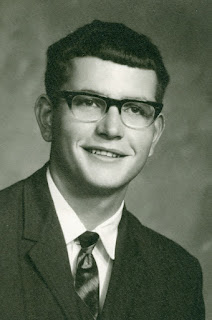I think about Merv sometimes, but especially this year --- the 25th anniversary of his death --- puzzling things out.
In some ways we were mirror images of each other --- both only children, close to each other in age, sons of sisters, both gay (something we recognized in each other when we were very young and always acknowledged), both Vietnam veterans --- but actually quite different.
At times we were very close and at others, more distant --- not hostility, but geography, temperament and culture. He was a solver of practical problems and could fix anything. I can't. He hunted, fished and could spend days on his own in the Big Horns with a sleeping bag and a gun. My idea of roughing it involves a motel. He was bold; me, not so much.
Merv was a Wyoming boy. If you’ve ever seen the film “Brokeback Mountain,” that’s the way it was out there when we were growing up, turning into young men. And still was as late as 1998 when Matthew Shepard was tied to a fence outside Laramie and left to die. Most of my Wyoming cousins attended the University of Wyoming, too; Merv thought his Buffalo High School diploma enough and did not.
We both loved Wyoming, however --- and I still do. But he lived there until breaking loose from it and I only visited. Eventually, after Vietnam and a stint wrangling dudes on the HF Bar, he got out and lived the last and best years of his life in Denver. Finding it harder and harder to go home again, eventually he didn’t.
Although not estranged from his parents, there were tensions. My uncle envisioned a son who was a "real man"; My aunt felt very strongly that marriage and children would cure Merv and provide her with the daughter-in-law and grandchildren she wanted.
After a certain point, Merv would not come to Iowa, where he had lived for a few years as a child (born in Sheridan, Wyoming, he started school in Chariton, Iowa). At that time (now past) the family here was strong, but whispered sometimes among themselves when “poor Mae’s” name came up about that son of hers. There were similar tensions within the Wyoming end of the family, fewer with the Colorado aunts, uncles and cousins; he always was willing to come to family gatherings there.
It was a good rich life in Denver and Golden, filled with work he enjoyed, friends, travel, adventures, lovers and the sort of freedom only a city offered gay men and lesbians then, surrounded by the family he had created but with much of his birth family at arm’s length. I was reading his old Christmas form letters, sent to kinfolk, the other day. They always ended --- “Yes, I’m still single; no, I’m not dating anyone; yes, I’m happy.”
Then he developed AIDS and as he grew sicker the whispers intensified. This was not something that was talked about much in good families back then --- the late 1980s and early 1990s when AIDS was a death sentence.
Merv, being Merv, as the time approached when he no longer would be able to care for himself, loaded a gun, walked into a field and ended it on his own terms, dying at Denver St. Anthony’s Hospital a few hours later.
It was his fault, of course --- that he was gay, that he didn’t marry and produce children, that he got sick, that he died, that he broke his mother’s heart, and that in the process of dying he used up all his resources so that nothing was left for her. There isn’t even a grave. His ashes were scattered in the Rockies.
More than 35 million people have died of AIDS worldwide since 1983; an estimated 36 million are living with it. In the United States, it is estimated that 30,000 new infections occur annually and that 1.2 million people are living with HIV. There have been about 675,000 deaths here. Mervin E. Gibbany (1949-1992), who died statistically by his own hand, was one of them.




No comments:
Post a Comment